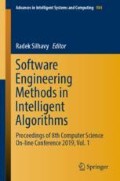Abstract
With the current spread of information and communication technologies (ICT), games can be even more implemented into school curriculums. Therefore, serious games (SG) may be more attractive not just for pupils, but also for teachers and lectors. The main purpose of this research is to introduce the first stage of our research: developing a 3D SG called Mathematical Dungeon focused on geometry for second-level primary school pupils. The SG consisted of several activities to learn basic geometric shapes (cubes and rectangular prism - cuboid). The Unity3Dgame engine was used as a development tool. We discuss the process of design and development such as modeling, scripting, creating scenes, rooms etc.. Pupils can interact with those scenes using personal computer or laptops. Game-based learning could be promoted as a way of offering something new and interesting and could enhance science, technology, engineering and mathematics education [1].
Access this chapter
Tax calculation will be finalised at checkout
Purchases are for personal use only
References
Misfeldt, M., Gjedde, L.: What is a game for geometry teaching: creative, embodied and immersive aspects (2015)
Országhová, D., Gregáňová, R.: The analysis of exams outcomes of the mathematical compulsory and optional subject. In: Forum Statisticum Slovacum, vol. 7, pp. 133–137 (2011). ISSN 1336-7420
Országhová, D., Gregáňová, R., Majorová, M.: Professional training of economists and managers in the context of the transformation of university education. In: Scientific papers (CD) “The Path of Internationalization and Integration in the Europe of Regions”, Curtea de Arges, Romania, pp. 259–264 (2007). ISBN 978-80-8069-857-7
Bopp, M.: Storytelling as a motivational tool in digital learning games. In: Didactics of Microlearning. Concepts, Discourses and Examples, pp. 250–266 (2007)
Chorianopoulos, K., Giannakos, M., Chrisochoides, N.: Design principles for serious games in mathematics. In: Proceedings of the 18th Panhellenic Conference on Informatics (2014). https://doi.org/10.1145/2645791.2645843
Zapletal, M.: Hry v klubovně. 1. vyd. Olympia, Praha, p. 567s (1986). ISBN 27-053-86
Breuer, J., Bente, G.: Why so serious? On the relation of serious games and learning. J. Comput. Game Cult. 4(1), 7–24 (2010). Eludamos
Ritterfeld, U., Cody, M.J., Vorderer, P.: Serious Games: Mechanisms and effects. Routledge, New York (2009)
Ritterfeld, U.: Beim Spielen lernen? Ein differenzierter Blick auf die Möglichkeiten und Grenzen von Serious Games. In: Computer + Unterricht, vol. 84, pp. 54–57 (2011)
Mišútová, M., Mišút, M.: Impact of ICT on the quality of mathematical education In: IMSCI 2012 - 6th International Multi-Conference on Society, Cybernetics and Informatics, Proceedings, pp. 82–86 (2012)
Štubňa, J.: Selected determinants influencing on student motivation in creating a relationship towards of science. In: Acta Humanica, vol. 13, no. 1, pp. 68–77 (2016)
Štubňa, J.: The importance of educational game as a part of teacher students preparation in the context of developing intersubject relationships in science subject. In: Acta Humanica, vol. 13, no. 2, pp. 39–45 (2016)
Toman, J., Michalík, P.: Possibilities of implementing practical teaching in distance education. Int. J. Modern Educ. Forum 2(4), 77–83 (2013)
Mišút, M., Pribilová, K.: Communication impact on project oriented teaching in technology supported education. Lecture Notes in Electrical Engineering, LNEE, vol. 152, pp. 559–567 (2013)
Gregáňová, R., Országhová, D.: K novým kompetenciám učiteľa matematiky v kontexte elektronického vzdelávania. In: Zborník vedeckých príspevkov z medzinárodnej vedeckej konferencie “The 6rd international conference APLIMAT”, pp. 337–343. STU, Bratislava (2007) (2007). ISBN 978-80-969562-8-9
Šimon, M., Huraj, L., Siládi, V.: Analysis of performance bottleneck of P2P grid applications. J. Appl. Math. Stat. Inf. 9(2) (2013). ISSN 1336-9180. (IET Inspec)
Polakovič, P., Hennyeyová, K., Šilerová, E., Hallová, M., Vaněk, J.: Managerial ICT education, innovation objectives and barriers to education of agricultural enterprises managers. In: Agrarian perspectives XXVII, pp. 243–251. Czech University of Life Sciences, Praha (2018). ISBN 978-80-213-2890-7
Pribilová, K., Gazdíková, V., Horváth, R.: Use of virtual excursions at secondary schools in Slovakia. In: 12th IEEE International Conference on Emerging eLearning Technologies and Applications (ICETA), Stary Smokovec, 2014, pp. 163–167 (2014). https://doi.org/10.1109/iceta.2014.7107578
Tóthová, D., Fabuš, J.: Portal of Slovak universities. In: ICABR 2015, pp. 1062–1068. Mendel University, Brno (2015). ISBN 978-80-7509-379-0. http://www.icabr.com/fullpapers/icabr2015.pdf
Acknowledgements
This paper was supported by KEGA project No.011UCM-4/2018.
Author information
Authors and Affiliations
Corresponding author
Editor information
Editors and Affiliations
Rights and permissions
Copyright information
© 2019 Springer Nature Switzerland AG
About this paper
Cite this paper
Hosťovecký, M., Fojtlín, F., Janšto, E. (2019). Mathematical Dungeon: Development of the Serious Game Focused on Geometry. In: Silhavy, R. (eds) Software Engineering Methods in Intelligent Algorithms. CSOC 2019. Advances in Intelligent Systems and Computing, vol 984. Springer, Cham. https://doi.org/10.1007/978-3-030-19807-7_41
Download citation
DOI: https://doi.org/10.1007/978-3-030-19807-7_41
Published:
Publisher Name: Springer, Cham
Print ISBN: 978-3-030-19806-0
Online ISBN: 978-3-030-19807-7
eBook Packages: Intelligent Technologies and RoboticsIntelligent Technologies and Robotics (R0)

